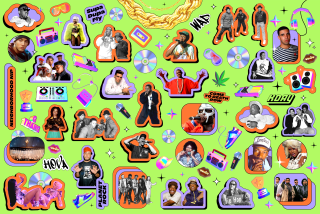The Rap on Some Rock Music : Lyrics put off distributor, which understandably chooses to pull the plug
- Share via
Geffen Records has rocked the music industry with its decision not to distribute an album by the rap music group Geto Boys. We hope the move helps focus debate on the content of rap lyrics, about which, it seems to us, reasonable people can raise reasonable questions.
The Geto Boys is one of those angry-young-men rap groups that has made its mark with a jaunty, street-smart, anti-Establishment irreverence. A lot of people like the irreverence; it’s the lyrics that some people don’t like.
Geffen says some Geto Boy lyrics endorse “violence, racism and misogyny,” and concludes it wants out of distributing the group. The decision comes at an auspicious moment in American cultural history: In a controversial Florida case, local authorities prosecuted the rap group 2 Live Crew for obscenity. So people are sure to worry that Geffen’s decision is a kind of new corporate censorship (with the target once again a black rap group). Added to the increasing government intervention, from Florida to the National Endowment for the Arts flap, the development would seem to bode ill for artistic creativity and individual choice.
The truth is that the group should have little problem finding a new distributor; its previous album, which was marketed independently, was a big seller. So the consumer will not likely be denied choice. But neither should a distributor. The appropriate place for the exercise of judgment is in the marketplace, and as a player in that market a firm like Geffen has the right to exercise judgment about the kind of product it wishes to produce.
What’s wrong is when government steps in and dictates to business what it cannot produce or what the consumer cannot purchase. That’s a different matter from a business deciding to forgo a certain product or the consumer deciding not to buy.
The best art, to be sure, can provoke and upset. It would be a national creative disaster if the parameters of conventional aesthetics were the sole permissible playing field for artists. But some music is a turn-off, and perhaps deserves to be turned off. This should happen through legitimate market decisions and not through governmental edict.
More to Read
The biggest entertainment stories
Get our big stories about Hollywood, film, television, music, arts, culture and more right in your inbox as soon as they publish.
You may occasionally receive promotional content from the Los Angeles Times.










